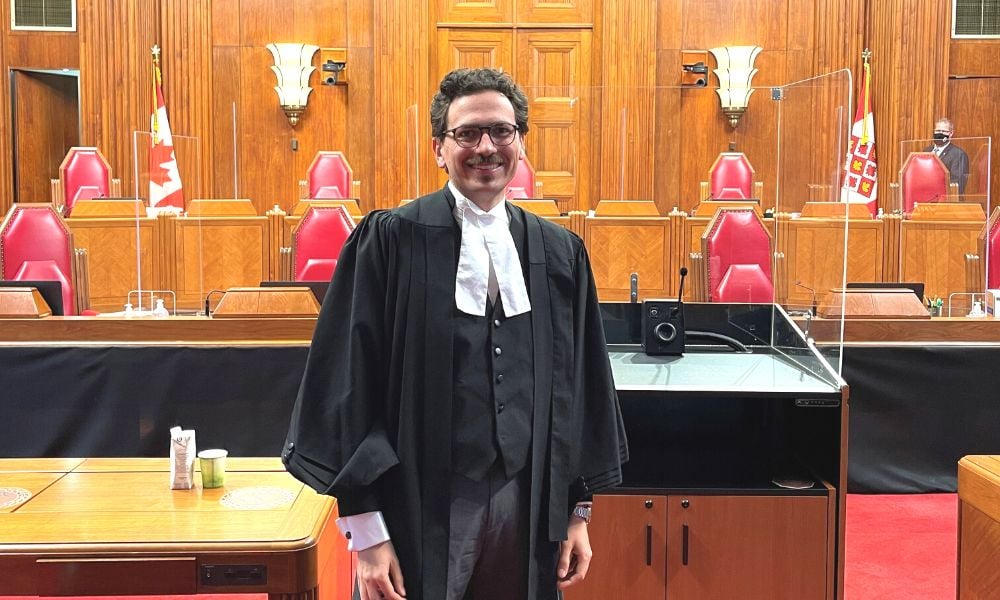Court finds public interest does not require detention while man challenges robbery conviction

The Ontario Court of Appeal has granted a man release pending his application for leave to appeal his robbery conviction to the Supreme Court of Canada, finding that his detention in the interim is not necessarily in the public interest.
The appellant’s lawyer, Myles Anevich, says it is rare for a court to grant bail pending leave to appeal to the SCC.
“Bail pending appeal has actually become much harder to get in general, and Crowns have been strongly opposing bails that they used to not oppose,” he says.
In R. v. Scott, 2022 ONCA 659, Court of Appeal Justice David Paciocco granted judicial interim release to Preston Scott, while Scott awaits the SCC’s judgment on his leave application. Anevich, a lawyer at Hicks Adams in Toronto, says Paciocco’s ruling contains “helpful language,” that will aid future applications for bail pending leave to appeal to the SCC.
In 2019, an Ontario court convicted Scott of robbery for his role in a violent home invasion and sentenced him to six-and-a-half years in prison. The Court of Appeal dismissed his conviction appeal, and he is attempting to bring his case before the SCC with two proposed grounds.
First, Scott argues that the Court of Appeal did not identify his argument of unreasonable verdict, even though he raised and argued that ground before the panel. In failing to consider his argument, the court rendered the appellate process procedurally unfair, he says.
This is an issue of law which meets the SCC’s standard of national importance, says Anevich.
“It would be totally unfair to the system, and I think, undermine our justice system, if there wasn't a way to address a clear mistake in the Court of Appeal’s reasons that frustrated his ability to advance his appeal at all.”
From the SCC, Anevich has asked for an appeal de novo, for the court to remit the case, with no deference, for a fresh hearing from the Court of Appeal. Scott then sought release from custody until he finds out whether he will get his rehearing.
Under s. 679.1(c) of the Criminal Code, an appeal court judge may order an appellant released from custody if the appellant’s appeal is not frivolous, the appellant will surrender themselves “into custody in accordance with the terms of the order,” and where their detention is “not necessarily in the public interest.”
At the Court of Appeal, the Crown did not dispute that Scott’s appeal was not frivolous, or that he would surrender himself, but argued that he could not establish that his detention was not necessary in the public interest.
Scott countered that neither of the two components, identified in R. v. Oland, 2017 SCC 17, and which support detention in the public interest, were present in his case. He neither poses a “risk to public safety,” nor was his crime serious enough that his detention is required to maintain “public confidence,” he argued.
While granting Scott the first point, Justice Paciocco did not accept the second. Scott was party to a home invasion during which masked intruders assaulted the victim with a hammer to steal narcotics. Justice Paciocco said it was therefore necessary to weigh the public’s interest in the case’s reviewability prior to detention against the public’s interest in enforcement of the sentence under appeal.
The Crown’s argument that Scott’s release was not in the public interest rested on the grounds that he was “highly unlikely” to get leave, that he has a serious criminal record, that it will not be long before the SCC renders a decision on the leave application, and that if it is granted, he can “reapply based on a change in circumstances.” Their public-interest argument also relied on R. v. Drabinsky, 2011 ONCA 647, which the Crown said had held that “immediate enforceability” is the general rule where leave is required to appeal an appeal decision.
But the latter element was an “overreading” of Drabinsky, said Justice Paciocco. And he paraphrased a passage from that ruling to demonstrate the point: “[i]t is more difficult in a leave to appeal situation for an appellant to meet the public interest requirement, than it is pending a first, as of right appeal. Nonetheless, no presumptive outcome is in place and the balance between the enforceability and reviewability remains case specific.”
Because of the “unusual circumstances” present in Scott’s appeal – an appeal ground had been overlooked by the appellate court – Justice Paciocco said he was satisfied that “the strength of the enforceability interest is significantly diminished.” Unlike many SCC appeals, he is asking the top court to consider a ground of appeal with which an appellate court has not dealt. “He is not asking for a second appeal but arguably, for a first one,” said the judge.










